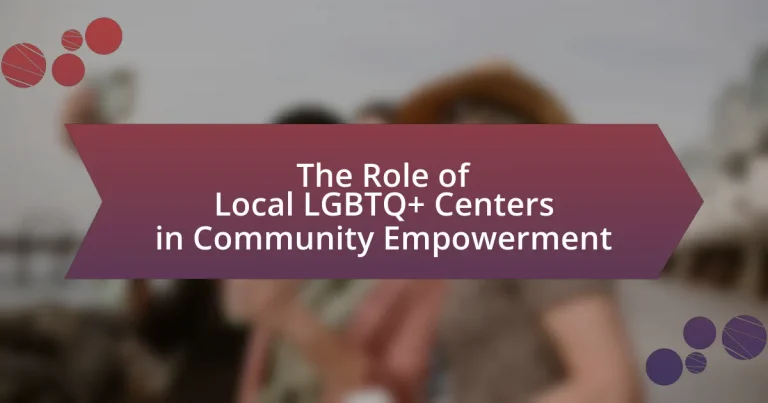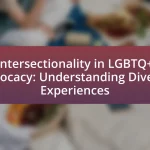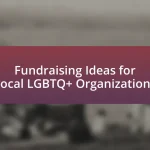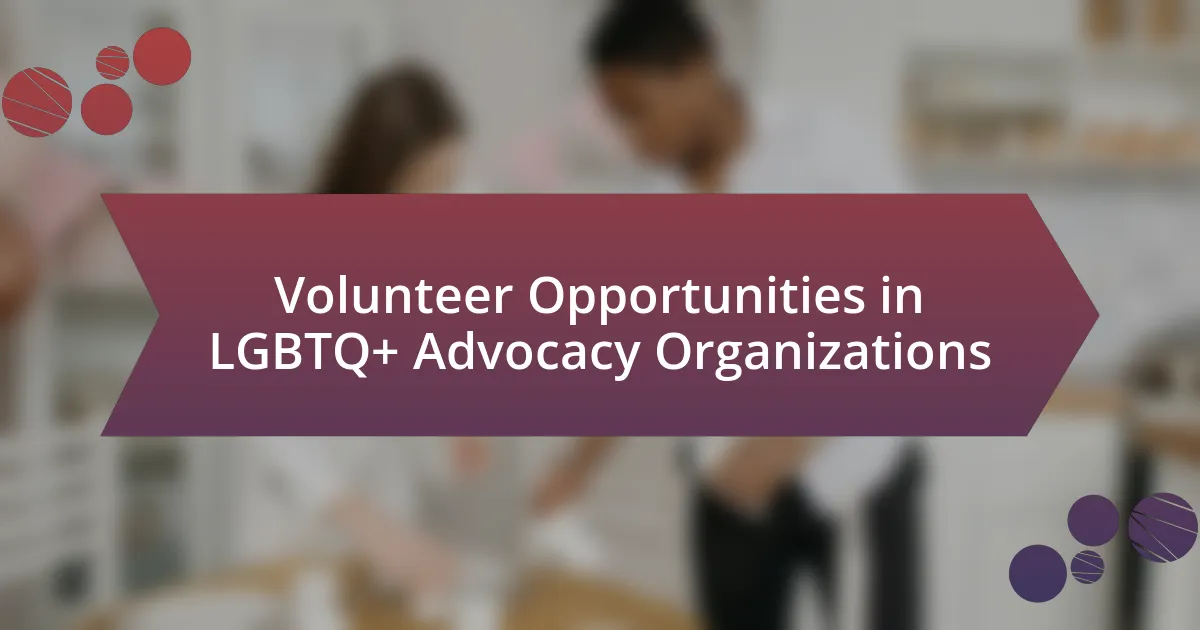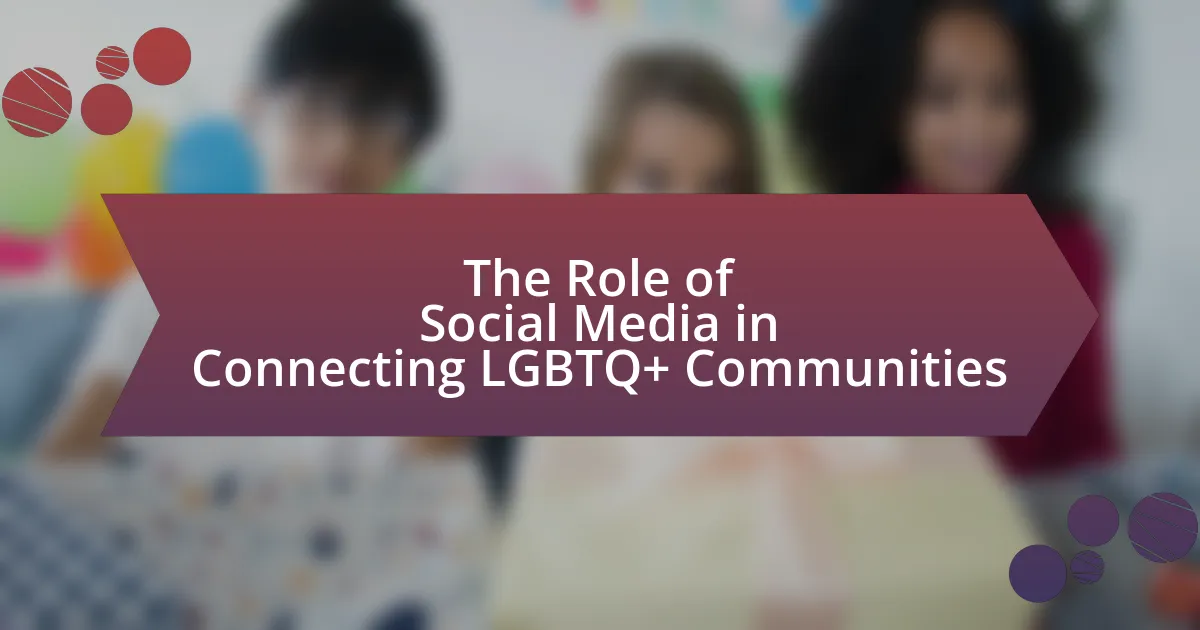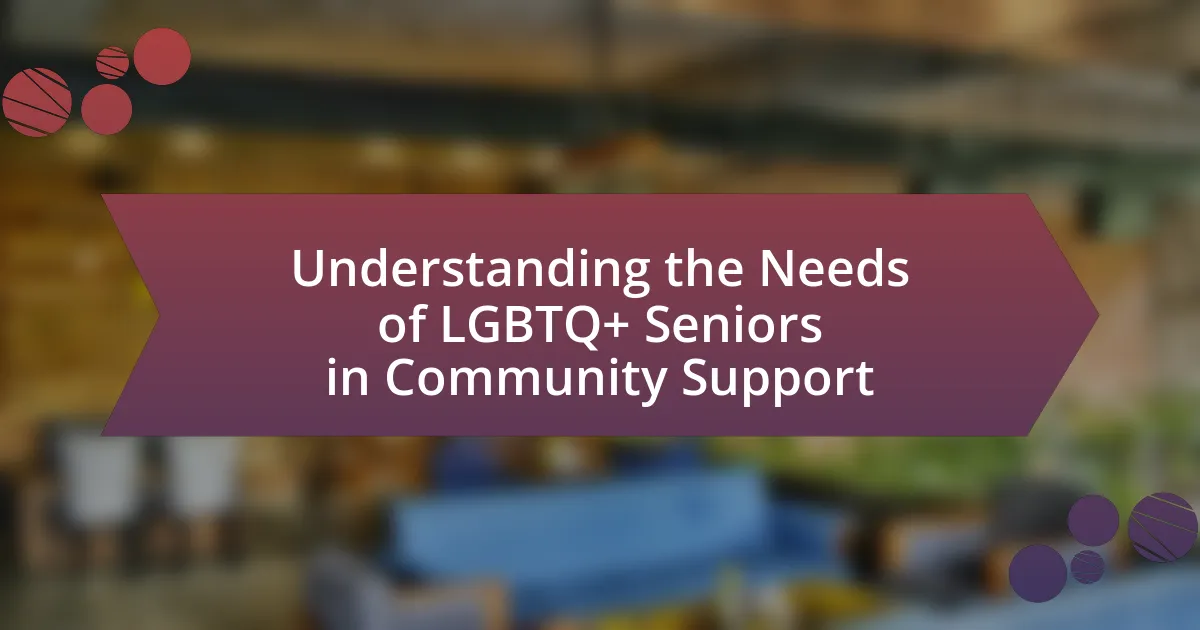Local LGBTQ+ centers are vital institutions that empower communities by providing essential resources, support, and advocacy for LGBTQ+ individuals. These centers facilitate access to mental health services, legal assistance, and educational programs, creating safe spaces for connection and community building. They also engage in advocacy efforts to promote policy changes and raise awareness about LGBTQ+ issues, thereby enhancing the visibility and representation of marginalized voices. Despite facing challenges such as funding limitations and societal stigma, local LGBTQ+ centers implement innovative programs and foster partnerships to strengthen their impact and support networks within the community.

What is the Role of Local LGBTQ+ Centers in Community Empowerment?
Local LGBTQ+ centers play a crucial role in community empowerment by providing resources, support, and advocacy for LGBTQ+ individuals. These centers facilitate access to essential services such as mental health support, legal assistance, and educational programs, which help individuals navigate challenges related to their sexual orientation or gender identity. For instance, a study by the Movement Advancement Project highlights that LGBTQ+ centers often serve as safe spaces where community members can connect, share experiences, and build networks of support. Additionally, these centers engage in advocacy efforts that promote policy changes and raise awareness about LGBTQ+ issues, further empowering the community by fostering a sense of belonging and collective strength.
How do Local LGBTQ+ Centers contribute to community building?
Local LGBTQ+ centers contribute to community building by providing safe spaces for individuals to connect, access resources, and engage in advocacy. These centers facilitate social support networks, which are crucial for mental health and well-being, as studies show that LGBTQ+ individuals often face isolation and discrimination. For instance, the Human Rights Campaign reports that LGBTQ+ youth who have supportive environments are 40% less likely to experience depression. Additionally, local LGBTQ+ centers often organize events, workshops, and educational programs that foster inclusivity and awareness, thereby strengthening community ties and promoting understanding among diverse groups.
What specific programs do these centers offer to foster community engagement?
Local LGBTQ+ centers offer various programs to foster community engagement, including support groups, educational workshops, and social events. Support groups provide safe spaces for individuals to share experiences and receive emotional support, while educational workshops focus on topics such as health, rights, and advocacy, enhancing knowledge and empowerment within the community. Social events, such as pride celebrations and community gatherings, encourage networking and solidarity among members, promoting a sense of belonging. These programs are essential for building connections and enhancing the visibility of LGBTQ+ issues within the broader community.
How do Local LGBTQ+ Centers facilitate networking among community members?
Local LGBTQ+ Centers facilitate networking among community members by providing safe spaces for social interaction, support groups, and organized events. These centers often host regular meetups, workshops, and social gatherings that encourage individuals to connect with one another, fostering a sense of belonging and community. For instance, studies have shown that participation in community events can significantly enhance social ties and support networks among LGBTQ+ individuals, leading to improved mental health outcomes. Additionally, many centers offer resources such as mentorship programs and networking opportunities that help members build professional connections, further strengthening community bonds.
Why are Local LGBTQ+ Centers essential for marginalized voices?
Local LGBTQ+ centers are essential for marginalized voices because they provide safe spaces for community engagement, support, and advocacy. These centers facilitate access to resources such as mental health services, legal assistance, and educational programs tailored to the unique needs of LGBTQ+ individuals. Research indicates that individuals who engage with local LGBTQ+ centers report higher levels of community belonging and lower rates of mental health issues, demonstrating their critical role in fostering resilience and empowerment within marginalized populations.
How do these centers provide a safe space for expression and support?
Local LGBTQ+ centers provide a safe space for expression and support by creating inclusive environments that prioritize acceptance and understanding. These centers often implement policies that promote confidentiality and respect, ensuring individuals feel secure when sharing their experiences. Additionally, they offer resources such as counseling, support groups, and educational workshops that empower community members to express their identities freely. Research indicates that safe spaces significantly reduce feelings of isolation and increase mental well-being among LGBTQ+ individuals, as highlighted in studies by the Williams Institute, which found that supportive environments lead to improved mental health outcomes.
What role do Local LGBTQ+ Centers play in advocacy and representation?
Local LGBTQ+ Centers serve as crucial hubs for advocacy and representation within their communities. They provide resources, support, and a platform for LGBTQ+ individuals to voice their concerns and experiences, thereby influencing local policies and societal attitudes. For instance, many centers engage in outreach programs that educate the public about LGBTQ+ issues, fostering understanding and acceptance. Additionally, they often collaborate with local governments and organizations to advocate for equal rights and protections, as evidenced by initiatives that have led to the implementation of non-discrimination policies in various municipalities. Through these efforts, Local LGBTQ+ Centers not only empower individuals but also contribute to broader societal change by ensuring that LGBTQ+ voices are heard and represented in decision-making processes.

What challenges do Local LGBTQ+ Centers face in their mission?
Local LGBTQ+ centers face significant challenges in their mission, primarily due to funding limitations, societal stigma, and legal barriers. Funding constraints often hinder their ability to provide essential services, as many rely on grants and donations that can be inconsistent. Societal stigma against LGBTQ+ individuals can lead to decreased community support and increased discrimination, making it difficult for centers to engage effectively with the populations they serve. Additionally, legal barriers, such as restrictive laws and policies, can limit the resources available to these centers and complicate their advocacy efforts. For instance, a report from the Movement Advancement Project highlights that many LGBTQ+ organizations struggle with financial sustainability, which directly impacts their capacity to fulfill their missions.
How do funding and resource limitations impact their effectiveness?
Funding and resource limitations significantly reduce the effectiveness of local LGBTQ+ centers in community empowerment. These centers often rely on financial support to provide essential services such as counseling, advocacy, and educational programs. For instance, a study by the Movement Advancement Project found that inadequate funding leads to reduced staffing and limited program offerings, which directly impacts the centers’ ability to meet the needs of the community. Consequently, when resources are scarce, centers struggle to implement outreach initiatives, resulting in decreased visibility and support for LGBTQ+ individuals.
What strategies can Local LGBTQ+ Centers employ to overcome financial challenges?
Local LGBTQ+ Centers can employ diverse fundraising strategies to overcome financial challenges. These strategies include hosting community events, such as pride festivals and charity runs, which not only raise funds but also increase visibility and community engagement. Additionally, centers can establish partnerships with local businesses for sponsorships and donations, leveraging mutual benefits to enhance financial support. Grant writing is another effective approach, as many foundations and government programs offer funding specifically for LGBTQ+ initiatives. Furthermore, implementing a membership program can create a steady revenue stream, encouraging community members to contribute regularly. According to a report by the Movement Advancement Project, LGBTQ+ organizations that diversify their funding sources are more resilient in times of financial uncertainty, highlighting the importance of these strategies.
How do societal attitudes affect the operations of Local LGBTQ+ Centers?
Societal attitudes significantly influence the operations of Local LGBTQ+ Centers by shaping their programming, funding, and community engagement. Positive societal attitudes can lead to increased support and resources, allowing these centers to offer more comprehensive services such as mental health support, legal assistance, and educational programs. Conversely, negative societal attitudes may result in reduced funding, limited outreach, and a lack of community participation, which can hinder the centers’ ability to fulfill their mission. For instance, a study by the Williams Institute found that areas with more accepting attitudes towards LGBTQ+ individuals tend to have more robust support systems and resources for these communities, demonstrating a direct correlation between societal perceptions and the operational capacity of Local LGBTQ+ Centers.
What are the key partnerships that enhance the work of Local LGBTQ+ Centers?
Key partnerships that enhance the work of Local LGBTQ+ Centers include collaborations with healthcare providers, educational institutions, and advocacy organizations. These partnerships enable Local LGBTQ+ Centers to offer comprehensive services such as mental health support, health screenings, and educational programs tailored to the LGBTQ+ community. For instance, partnerships with healthcare providers can facilitate access to specialized medical care, while collaborations with educational institutions can promote awareness and inclusivity through training and workshops. Additionally, alliances with advocacy organizations strengthen community outreach and policy influence, ensuring that the needs of LGBTQ+ individuals are represented and addressed effectively.
How do collaborations with local businesses benefit these centers?
Collaborations with local businesses benefit LGBTQ+ centers by providing essential resources, funding, and visibility. These partnerships often result in financial support through sponsorships or donations, which can enhance the centers’ programs and outreach efforts. For instance, a study by the Williams Institute found that community partnerships can increase funding by up to 30%, allowing centers to expand their services. Additionally, local businesses can help raise awareness about the centers through joint marketing efforts, thereby attracting more community members and fostering a supportive environment. This synergy not only strengthens the centers but also promotes inclusivity within the broader community.
What role do educational institutions play in supporting Local LGBTQ+ Centers?
Educational institutions play a crucial role in supporting local LGBTQ+ centers by providing resources, advocacy, and educational programs that promote inclusivity and awareness. These institutions often collaborate with LGBTQ+ centers to host events, workshops, and training sessions that educate students and staff about LGBTQ+ issues, fostering a more accepting environment. For instance, many universities have established partnerships with local LGBTQ+ organizations to facilitate safe spaces and support networks for LGBTQ+ students, which enhances community engagement and empowerment. Additionally, research indicates that educational institutions that actively support LGBTQ+ initiatives contribute to improved mental health outcomes for LGBTQ+ youth, as highlighted in studies by the Human Rights Campaign, which show that inclusive environments significantly reduce feelings of isolation and discrimination.

How can individuals support Local LGBTQ+ Centers in their community?
Individuals can support local LGBTQ+ centers by volunteering their time, donating funds, and participating in community events. Volunteering helps centers operate effectively and provides essential services, while financial contributions enable them to sustain programs and outreach efforts. Participation in events raises awareness and fosters community engagement, which is crucial for the visibility and support of LGBTQ+ issues. According to a report by the Movement Advancement Project, local LGBTQ+ centers play a vital role in providing resources and support, making individual contributions essential for their success and impact in the community.
What volunteer opportunities are available at Local LGBTQ+ Centers?
Local LGBTQ+ Centers offer various volunteer opportunities, including event planning, outreach programs, and support services. Volunteers can assist in organizing pride events, educational workshops, and community health initiatives, which are essential for fostering inclusivity and awareness. Additionally, many centers seek volunteers for administrative tasks, mentoring programs, and advocacy efforts, contributing to the empowerment of the LGBTQ+ community. These roles not only support the center’s mission but also provide volunteers with valuable experience and connections within the community.
How can community members contribute to fundraising efforts for these centers?
Community members can contribute to fundraising efforts for local LGBTQ+ centers by organizing events, such as bake sales, charity runs, or benefit concerts, which directly generate funds. These events not only raise money but also increase awareness and engagement within the community. For instance, a study by the Human Rights Campaign found that community-driven events can raise significant amounts, with some local centers reporting over $10,000 from a single event. Additionally, community members can leverage social media platforms to promote crowdfunding campaigns, reaching a wider audience and encouraging donations. This approach has proven effective, as online fundraising platforms have seen a 30% increase in donations for LGBTQ+ causes in recent years.
What best practices can enhance the impact of Local LGBTQ+ Centers?
Local LGBTQ+ Centers can enhance their impact by implementing inclusive programming, fostering community partnerships, and providing accessible resources. Inclusive programming, such as support groups and educational workshops, addresses the diverse needs of the LGBTQ+ community, promoting mental health and social connection. Community partnerships with local organizations, schools, and businesses can amplify outreach efforts and create a supportive network, as evidenced by studies showing that collaboration increases resource availability and community engagement. Additionally, ensuring that resources, such as healthcare services and legal assistance, are accessible to all community members, including marginalized groups, is crucial for effective support. Research indicates that centers that prioritize accessibility see higher participation rates and improved community well-being.
How can centers effectively measure their community impact?
Centers can effectively measure their community impact by utilizing quantitative and qualitative metrics, such as surveys, participation rates, and community feedback. Surveys can assess the satisfaction and needs of community members, while participation rates in programs and events provide data on engagement levels. Additionally, collecting testimonials and case studies from individuals who have benefited from the center’s services offers qualitative insights into the center’s influence. Research indicates that centers that implement these measurement strategies can better understand their effectiveness and areas for improvement, ultimately enhancing their role in community empowerment.
What innovative programs have proven successful in empowering local LGBTQ+ communities?
Innovative programs that have proven successful in empowering local LGBTQ+ communities include peer support networks, health outreach initiatives, and educational workshops. Peer support networks, such as those implemented by organizations like The Trevor Project, provide safe spaces for LGBTQ+ individuals to share experiences and receive guidance, significantly reducing feelings of isolation. Health outreach initiatives, exemplified by programs like the LGBTQ+ Health Initiative in San Francisco, focus on providing accessible healthcare services tailored to the unique needs of LGBTQ+ individuals, resulting in improved health outcomes. Educational workshops, such as those offered by local LGBTQ+ centers, promote awareness and understanding of LGBTQ+ issues, fostering inclusivity and acceptance within the broader community. These programs collectively enhance community cohesion and empower individuals by addressing specific needs and challenges faced by LGBTQ+ populations.
